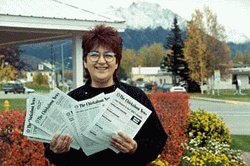|
No one remembered how or when but somehow a small plot of land where their dead were buried had come into private hands. The spirit houses, similar in a way to tombstones, were in great disrepair. "I asked the people what I could do for them," says Patricia Wade. "They said, 'Get our graveyard.'"
That was when Wade started to write.
 |
| Patricia Wade |
 |
She wrote letters appealing to the President, to members of Congress, to any organization she thought might be sympathetic to her cause. She asked for help. In the meantime, the small plot of land changed hands more than once.
At one time an Asian man owned it. Tribal members wanted to bury Wade's uncle there. They spoke with the man and thought they had come to some agreement, but when they started digging he began yelling. It had all been a sad miscommunication.
The struggle over that graveyard land is still going on, but since then Wade has discovered many other ways to help her people through her writing.
For Patricia Wade, the written word has a particular power. It has the power to inform, the power to persuade, and even, sometimes, the power to change people.
Wade's heritage is Athabaskan Indian. According to oral tradition her people have been in Alaska for thousands of years. Her tribe, which is one part of the entire Athabaskan nation, is from Chickaloon Village near the city of Palmer, Alaska. Wade's mother, Katherine Wade, has lived much of her life in Chickaloon, next to Moose Creek, where she once speared a large salmon which fed everyone, and became a hero in the tribe.
When Wade was a young girl, one of her school teachers told her she had a gift for writing. "But I never really used it until I started working for my tribe," Wade says.
Wade was schooled in the white people's world, but at home she heard Native stories. She heard about what life was like around the time of World War I, when the railroad came to Chickaloon bringing with it coal mining, and all kinds of people.
She heard about the time a white man came to visit her grandfather, how after several visits the man asked if her grandfather had seen gold-quartz, and if he could show some to the man. Her grandfather showed the man and soon came many men, with pick axes and other tools. Her grandfather didn't understand. People were supposed to be caretakers of the land. He saw no care in what the man did.
Then there was the time a white woman told Wade's aunt she had bought some land in the village.
"My aunt asked, 'Who did you buy the land from?' She didn't understand. To her no one owned the land. You loved it, you respected it, you saw beauty in it. It was alive," says Wade. "Suddenly my aunt and my mother couldn't go back to the places they had traveled through their whole lives because those places were private property."
It took years before these stories had their significance for Wade. Before she sat down to write them she had to travel herself. As a young woman she left her home and spent many years moving around Alaska. She married more than once, had four children, and worked various jobs before, at fifty years old, she finally found her way back to the Chickaloon area in 1995.
"It was like going down the wrong road and then coming back to my roots," Wade says.
When she arrived there was a job opening as an administrative assistant at the Chickaloon Village Tribal Office. She took it. Wade is 54 years old now. She has only been writing for her tribe for four years, but she says in just that small amount of time she feels a change has begun.
"I'm starting to see more public awareness of Native issues," she says. "The indigenous people are gaining more power. We're no longer invisible."
|




